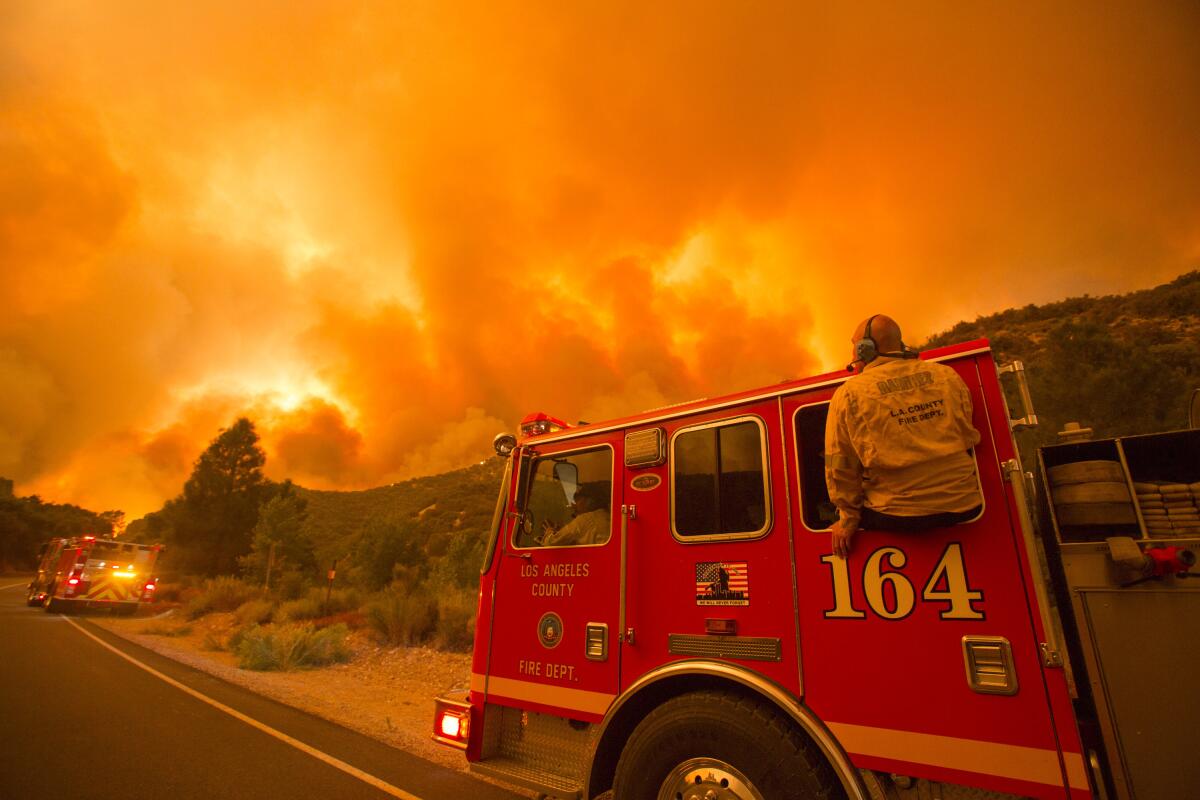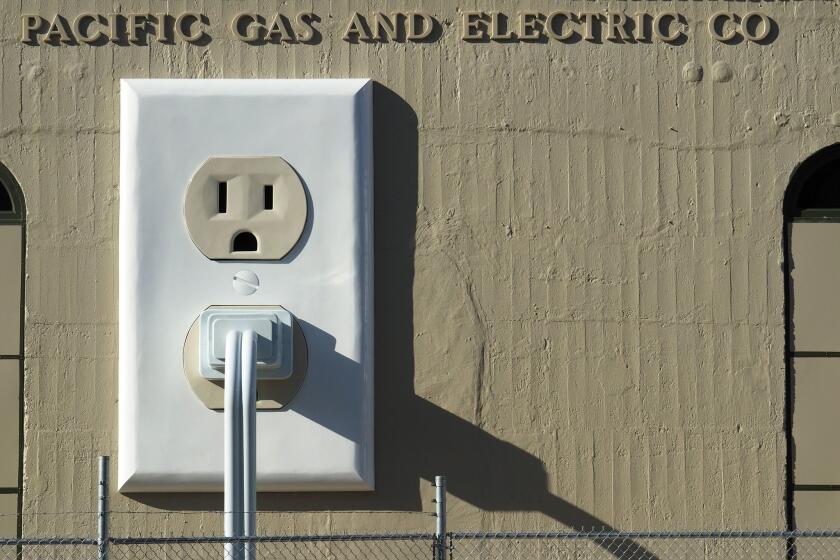Lawmakers want to extend California utility customer fee for wildfire and climate projects

- Share via
SACRAMENTO — With more than 1 million acres burning in California, state lawmakers are pushing a last-minute proposal that would extend an existing fee on electricity bills to fund $500 million for immediate wildfire response and another $2.5 billion over time for climate resiliency and fire mitigation projects.
The legislation adopts the same financing mechanism as a 2019 law that extended a fee on utility bills for 15 years to finance bonds for a $21-billion insurance pool to pay utility wildfire damages. This time, the same fee would be extended for another decade until 2045 — costing ratepayers 96 cents a month, or more than $3 billion over 10 years — for bonds to pay for wildfire prevention work, according to a document reviewed by The Times and interviews with lawmakers and legislative staff.
“It would be negligent for the Legislature to end our session without taking immediate action to generate more resources for battling wildfires across California and mitigating the resulting environmental damage,” said Assemblyman Kevin Mullin (D-South San Francisco), a coauthor of the bill. “It is also imperative that we better prepare our state for longer and more dangerous fire seasons to come.”
The plan was introduced late Tuesday as wildfires raged up and down the state. While some of California’s deadliest wildfires in recent years have been caused by failed utility equipment, state officials said lightning strikes sparked the major fires burning in Santa Cruz and San Mateo counties, and other parts of the state.
The new proposal also comes after attempts to place taxpayer-funded climate bonds on the 2020 ballot stalled at the state Capitol two years in a row. AB 1659 does not need voter approval but faces difficult two-thirds votes in the Senate and Assembly by the end of the legislative session on Monday — a higher threshold for legislative passage to ensure the measure would take effect as soon as it is signed into law.
Gov. Gavin Newsom declined to comment on whether he supports AB 1659, which would develop immediate and longer-term plans to spend the bond proceeds.
The first plan, which would be developed within 30 days from the date the bill is enacted, calls for the state to borrow and spend $500 million from a state surplus cash fund to train new firefighters, respond to wildfire emergencies and carry out immediate projects to reduce wildfire risks. The state would pay the money back by the end of the fiscal year using proceeds from the revenue bonds, according to the document.
A longer-term spending plan to be formed within six months of the bill’s passage would spend the bond proceeds on wildfire mitigation and climate projects. Of the money, $100 million would go toward workforce training, with $200 million for local and state government grants for fire detection, warning and evacuation systems, emergency communication and disaster planning.
The bill would allocate $300 million to the state Natural Resources Agency for prescribed burns, home hardening, defensible space and other projects to reduce risks in California’s wildland-urban interface regions, and $300 million to reduce fire risks and repair damage at state parks. In addition, $200 million would be distributed by the California Wildlife Conservation Board for forest restoration and wildfire resilience, and $300 million would be set aside for projects such as cooling centers and solar power.
Assemblyman Richard Bloom (D-Santa Monica), who introduced the bill, said the current wildfires added a sense of urgency to plans in the Legislature to do more to prevent wildfires before the pandemic hit and the economy collapsed.
“This is, to some degree, born out of that desire to do something in that space, but it became imperative as we watched this recent series of fires rage through the state,” Bloom said.
The bill’s reliance on another extension of a fee on customers of Pacific Gas & Electric, Southern California Edison and San Diego Gas & Electric is already raising concerns among some lawmakers.
As Pacific Gas & Electric exits bankruptcy, it’s not clear there’s anything fundamentally different about the California utility.
Newsom and the Legislature quickly crafted and passed Assembly Bill 1054 last summer amid pressure from Wall Street to reduce the utility industry’s liability for wildfire damages linked to their electrical poles and equipment. Lawmakers made it easier for utilities to avoid being on the hook for wildfire damages through a new safety certification process and created a $21-billion fund as an additional shield against losses from blazes linked to their equipment.
Utility customers were required to pay half of the $21 billion through a 15-year extension of an existing charge on monthly bills that was originally expected to expire by 2021. Advocates of AB 1054 said that the law didn’t increase customer rates — an argument that is being repeated this year.
“One of the things you hear over and over again in Sacramento is, well if you want to do something, what’s the funding source going to be?” Bloom said. “And that’s no different in this case. The cause is compelling but it still needs a funding source and this one is quite elegant. It’s a relatively small fee that ratepayers are already paying.”
More to Read
Sign up for Essential California
The most important California stories and recommendations in your inbox every morning.
You may occasionally receive promotional content from the Los Angeles Times.















